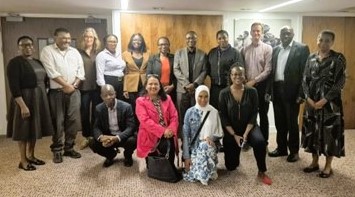How Bristol became a natural host of the Hub for The OU’s Minority Ethnic Leadership (MEL) Programme
In this blog, Olufemi Oloruntimehin, Law student and Student Intern with the Centre for Voluntary Sector Leadership (CVSL) explores how Bristol was a natural fit for the MEL Programme.

MEL Programme Learning Hub May 12, 2025
The city of Bristol has a complex history which is intertwined with the transatlantic slave trade. Bristol has been a focal point for racial justice activism; from the 1963 Bristol Bus Boycott to the widely efficient Black Lives Matter (BLM) protests of 2020 and 2021, the Black community in Bristol has consistently mobilised to fight systemic racism and inequality. This blog will explore continuing racial justice struggles in Bristol, highlighting events, figures, and their impact on society.
Historical context: Resistance to Empowerment
Bristol's history and wealth are deeply intertwined with the transatlantic slave trade, and that legacy continues to influence its social and political landscape; it is a legacy immortalised by statues of figures such as Edward Colston, a 17th-century slave trader. For decades, activists have campaigned for its removal, arguing it symbolises racial oppression. In June 2020, during the worldwide Black Lives Matter protests, the statue was torn down by a multiracial coalition led by Black organisers (Bristol City Council, 2021). This defiant act resulted from a culmination of past events and set the stage for subsequent events.
1963 Bristol Bus Boycott:
In the early 1960s, Bristol's BAME communities were burdened with discrimination, notably in employment. The Bristol Omnibus Company, in coalition with the Transport and General Workers Union (TGWU), practised a "colour bar" policy refusing non-whites employment despite labour shortages. This situation prompted activists like Roy Hackett, Owen Henry, Paul Stephenson, Audley Evans, and Prince Brown to organise a city-wide boycott in April 1963 (The bus boycott). The boycott lasted four months, garnering attention from politicians and community leaders. Inspired by the American civil rights movement like the 1955 Montgomery bus boycott organised by Rosa Parks and other activists who refused to give up their seats (First Bus, October 2023) on August 28, 1963, the same day as Martin Luther Junior's "I have a dream" speech. The company abolished its discriminatory hiring policies, which led to Raghbir Singh becoming Bristol's first non-white bus conductor on September 17, 1963. (BHM,2025). The boycott was a success, and it led to the Race Relations Acts of 1965 and 1968, legislatively outlawing racial discrimination in public places and providing protections for employment and housing. The enactment of this legislation has been cited by some as having been influenced by the Bristol bus boycott (Robert Verkaik, Legal Affairs Correspondent for The Independent newspaper).
The 1980 St Pauls Disturbances
On April 2, 1980, the St Paul’s area of Bristol witnessed a police raid on a Black and White Café, which was a central hub for the Afro-Caribbean community. This incident was perceived as an act of targeted aggression on the Black community, resulting in injury to twenty-five people and the arrest of 130 people. All sixteen individuals who were charged were later acquitted of wrongdoing, highlighting the community's practical solidarity and legal defence (BBC)
This incident was the result of a culmination of years of systemic neglect, discrimination, and economic isolation; after the incident, the Afro-Caribbean community continued to face increasing unemployment and deteriorating race relations made worse by right-wing groups such as the National Front (Stephen, 1994). The area continued to witness continuous targeting with the use of "sus laws", which allowed the police to stop and search individuals based on suspicion alone, disproportionately targeting Black youth and fuelling resentment.
The Response: Black community leaders organised to tackle the underlying issues. Prominent leaders such as Paul Stephenson, a civil rights activist who had led the 1963 Bristol Bus boycott, continued his advocacy for racial equality. He founded the West Indian Development Committee (WIDC) to create opportunities and improve race relations (Bristol Post). Centres such as the Malcolm X Centre were established by community leaders to provide spaces for cultural expression, education, and social support and served as tools for addressing systemic inequalities and policy change advocacy.
The 2020 BLM Protests
Following the death of George Floyd in the United States at the hands of the police, a global outcry was heard, which resonated deeply in Bristol because of its history of systemic inequalities. On June 7, 2020, about 10,000 people gathered to protest not just against the death of George Floyd but also against the ongoing racial disparities and systemic racism, including police brutality in Bristol. This event led to the toppling of the Edward Colston Statue by a multiracial coalition led by Black organisers (Bristol City Council, 2021). This defiant act changed Bristol's identity and set the arena for future protests.
The 2021 Protests and the "Colston Four"
The proposed Police, Crime, Sentencing and Courts Act introduced in March 2021 proposed sweeping powers to restrict protests the police view as "disruptive". BAME groups such as Sistah Space and BLM Bristol argued it would disproportionately target marginalised communities and was seen as a way of silencing minority communities in their quest for equality. This warning widely resonated in a city where Black people were nine times more likely to be stopped and searched than white residents (Avon and Somerset police, 2020). The peaceful protest escalated after heavy-handed intervention by the police at Bridewell Police Station. The media portrayed the demonstrations as thuggery and vandalism. At the same time, activists such as Judah Adunbi, a prominent voice in Bristol's Black community, said, “This is not just about a bill; it is about decades of being silenced (The Guardian, 2021). In January of the same year four individuals dubbed “Colston four2 were charged with criminal damage for their participation in toppling the Edward Colston statue, a renowned profiteer from the 18th-century slave trade in Bristol. In January 2022, they were, however, acquitted.
Continuity and progress: Link between past and present
These events prompted broader social reflections on race, leading to resolutions to address racial disparities. The 1963 boycott happened in an atmosphere of overt racial discrimination, while the 2020 and 2021 events took place in a more diverse and politically engaged society with few Black leaders occupying leading roles leading to Initiatives such as the Bristol Race Reform was formed to evaluate Bristol’s past and the Bristol Race Forum set up to promote BAME opinions during policy-making sessions.
UNITE, the Transport and General Workers Union successor, issued an apology concerning the 1963 boycott in February 2013. Laurence Faircloth, the union’s Southwest Secretary, said of its stance at the time, "It was completely unacceptable. I can accept the sense of injustice and pain that has been felt because of what happened in Bristol all those years ago.”
In 1980, the Bristol Community Constable of Police stated, “Things are bound to get better, and I think I know in the future, maybe not in my lifetime, the problem we have now and in every other major city will no longer exist”.
Lessons Learnt
- Policing reforms are not enough- Independent supervision is vital in police practices, and for BAME members of society to trust in the police, there must first be an addressing of the systemic biases.
- Confronting history- Coming to terms with the past of Bristol city is essential to healing between communities and coming to an understanding that to the BAME communities, removing symbols of oppression would be a first step and a fair investment in BAME communities to follow.
- Involving marginalised people's opinions in policy-making- Policies which impact everyday lives should include opinions and views of BAME communities for their perspective and how they are affected.
- Media- The media has a significant role in fostering national cohesion; therefore, reducing the protests to violence vs order and savages vs the law did nothing but worsen the situation. Understanding the views, perspectives, and grievances, both historical and present, of BAME communities would help foster relationships.
Conclusion
The 1963 boycott, the 1980 St. Paul disturbances and the 2020-2021 BLM protests serve as reminders of challenges faced by Black communities in the United Kingdom and the resilience of BAME groups and organisations in confronting systemic racism.
Britain, likewise Bristol, continues to grapple with its historical legacy of oppression and racial injustice and strives for a more equitable future for all, regardless of race; the lessons learnt from these historical moments of resilience underscore the necessity of inclusive leadership in education, business, and employment, community engagement and commitment to social justice.
References
- Small, Stephen (1994). Racialised Barriers: The Black Experience in the United States and England in the 1980s.
- Utrecht University, (2020-2022). Stop, search, and violate: The Anti-Blackness of stop and search policing in contemporary Europe. Microsoft Word - K.KING_ThesisDraftFinal.docx
- Bristol Boycott of 1963- Black History Month 2025. The Bristol Bus Boycott of 1963 - Black History Month 2025
- First bus. Swapping the streets of Bristol for the streets of London | First Bus WE&W News
- “In Britain, a Black Lives Matter Statue Sparks an Important Debate Around Representation. In Britain, a Black Lives Matter Statue Sparks an Important Debate Around Representation | Vogue
- Malcolm X Community Center | Bristol | England
- Paul Stephenson obituary. The Guardian. Paul Stephenson obituary | Race | The Guardian
- St Paul's 1980: St Paul's 1980: 'Things in the Black and White Café…
- Thames TV, (St Paul/Racial tension/Bristol): https://youtube.com/watch?v=I8Lyg5bt5Qg&si=GzYuph9_IJcWFHhN
- The Bus Boycott. The Bus Boycott
- The St Pauls Riots: St Pauls Riots


